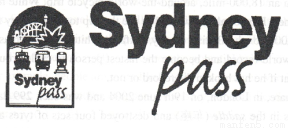题目内容
The value-packed, all-inclusive sight-seeing package that combines the best of Sydney’s harbor, city, bay and beach highlights.
A SydneyPass gives you unlimited and flexible travel on the Explorer Buses: the ‘red’ Sydney Explorer shows you around our exciting city sights while the ‘blue’ Bondi Explorer visits Sydney Harbour bays and famous beaches. Take to the water on one of three magnificent daily harbor cruises (游船). You can also travel free on regular Sydney Buses, Sydney Ferries or CityRail services (limited area), so you can go to every corner of this beautiful city.
Imagine browsing at Darling Harbour, tasting the famous seafood at Watsons Bay or enjoying the city lights on an evening ferry cruise. The possibilities and plans are endless with a SydneyPass. Wherever you decide to go, remember that bookings are not required on any of our services so tickets are treated on a first in, first seated basis.
SydneyPasses are available for 3, 5 or 7 days for use over a 7-calendar-day period. With a 3 or 5-day pass you choose on which days out of the 7 you want to use it. All SydneyPasses include a free Airport Express inward trip before starting your 3, 5 or 7 days, and the return trip is valid for 2 months from the first day your ticket was used.
SydneyPass Fares

Adult | Child* | Family** | |
3-day ticket | $90 | $45 | $225 |
5-day ticket | $120 | $60 | $300 |
7-day ticket | $140 | $70 | $350 |
*A child is defined as anyone from the ages of 4 years to under 16 years. Children under 4 years travel free.
**A family is defined as 2 adults and any number of children from 4 to under 16 years of age from the same family.
1.A SydneyPass doesn’t offer unlimited rides on ________.
A. the Explorer Buses B. the harbor cruises
C. regular Sydney Buses D. CityRail services
2.With a SydneyPass, a traveller can ________.
A. save fares from and to the airport
B. take the Sydney Explorer to beaches
C. enjoy the famous seafood for free
D. reserve seats easily in a restaurant
3.If 5-day tickets were to be recommended to a mother who travelled with her colleague and her children, aged 3, 6 and 10, what would the lowest cost be?
A. $225. B. $300. C. $360. D. $420.

